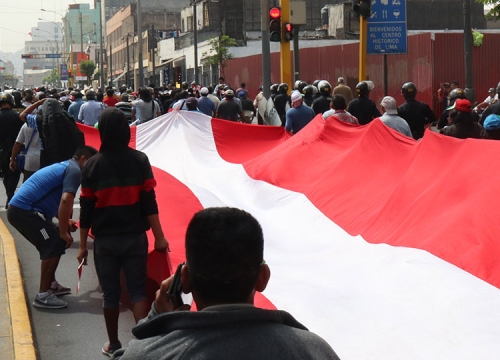The Quest for Accountability for the Violations of Freedom of Peaceful Assembly and of Association in Peru: Challenges and Perspectives
Event


Adobe
In December 2022, following the ouster and imprisonment of former President Pedro Castillo, Peru has seen historic social fractures resurface in a socio-political crisis, marked by widespread and systematic human rights violations. Several popular demonstrations against the newly appointed government have taken place, carried out by various segments of Peruvian civil society, with broad participation of peasant and indigenous peoples. According to official data, at least sixty people have been killed and more than one thousand injured, as a consequence of the repression by the police force and the army.
Several international human rights mechanisms and bodies have already expressed their concerns and repudiation of the atrocities committed against civilians in Peru, such as the Office of the United Nations High Commissioner for Human Rights (OHCHR), the Inter-American Commission on Human Rights (IACHR) and several UN Special Procedures, and in particular the former Special Rapporteur on freedom of peaceful assembly and association, Clement Voule, who conducted an official visit to the country in May 2023.
On the 27th of June 2024, the newly appointed Special Rapporteur, Gina Romero, will present the report of the visit to Peru during her interactive dialogue at the Human Rights Council. This will be the occasion for civil society organizations, and in particular Peruvian organizations directly affected, to further engage with the Special Rapporteur and claim the cease of repressive actions, the respect of the right to life and physical integrity, the right to protest, the rights to freedom of expression, freedom of association and peaceful assembly of human rights defenders and of all demonstrators.
This side event to the 56th session of the Human Rights Council, co-organized with Centre Europe – Tiers monde (CETIM), Red Wiphalas – Suiza, and Quinto Suyo Peru -Suiza, will be the opportunity to continue the discussion of the report in tackling the current and main challenges ahead in the protection of the fundamental rights of the Peruvian people, and in particular the right to freedom of peaceful assembly and association.
Panel
- Clément N. Voule, Former UN Special Rapporteur on freedom of peaceful assembly and association
- Lourdes Huanca, Indigenous leader and President of the Federación Nacional de Mujeres Campesinas, Artesanas, Indígenas, Nativas y Asalariadas del Perú
- Mar Perez, Lawyer at the Coordenadora Nacional de Derechos Humanos
- Raúl Samillán, President of the Asociación de Familiares de las víctimas
- Gina Romero, UN Special Rapporteur on freedom of peaceful assembly and association
Drinks
The event will be followed by drinks.
Disclaimer
This event may be filmed, recorded and/or photographed on behalf of the Geneva Academy. The Geneva Academy may use these recordings and photographs for internal and external communications for information, teaching and research purposes, and/or promotion and illustration through its various media channels (website, social media, newsletters, annual report, etc.).
By participating in this event, you are agreeing to the possibility of appearing in the aforementioned films, recordings and photographs, and their subsequent use by the Geneva Academy.









